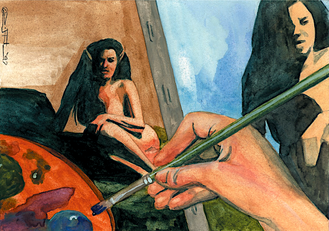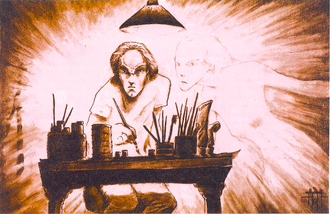Reverie is one of the four ways of Epiphany that Changelings use to harvest Glamour.
Overview[]

Reverie, also called Musing, is considered the most noble method of gathering Glamour. A Changeling spends time cultivating the Dreamer, inspiring the mortal to tap into the Dreaming, and create a Glamour-filled work. Reverie is looked favorably upon by Kithain because it is sustainable and more beneficial to the mortal in the long run.
The Seelie Court prefers Reverie to Ravaging as a means to achieving epiphany because it keeps the precious few True Dreamers in the world creating works of art, as opposed to taking the chance of draining their creativity permanently as Ravaging can do. The Unseelie tend to consider Reverie too time-consuming for too little return. Some Unseelie nobles and a few rare Unseelie commoners occasionally use Reverie as their preferred method to gain Glamour. However, the artists and art they inspire usually relates to change or a darker form of art or creation than the Seelie would choose.
Changelings who follow the pathway of Reverie to gather Glamour are sometimes viewed as muses or patrons to the mortals they nurture. It is necessary for Kithain to study and get to know their subjects over a period of time. This communion helps the changeling understand what inspires and how to best aid them in developing their creativity. Knowing the right words and ways to push a mortal to create ever greater wonders is the key to a long-lasting and mutually beneficial fount of Glamour for the Kithain. The more time and creativity the muse spends on the Dreamer, the better the Dreamer's art will be and the more Glamour they will produce.
Many muses use love as a source for inspiration, although it can be risky for both parties. Love can grow into obsession; the artist might become enraptured with the muse rather than the art. On the other hand, if the mood of the Kithain changes, perhaps to anger or jealousy, a long term and formerly beneficial Reverie can become a bitter Ravaging, or a violent punishment through Rhapsody in a worst-case scenario.
A muse experiences Reverie and gains Glamour by being exposed to the product of the Dreamer's work, whether it be a novel, poem, painting, recording, a divinely created meal, or an appreciative audience. Sometimes a muse's influence is so instrumental to the work, and the work is so potent, that Glamour is received every time the creation overwhelms a new audience.
A Reverie's concrete form... novel, painting, etc... eventually becomes diluted and unable to generate more Glamour through repeated contact with mortals. A new song or play performed before a live audience may release copious amounts of Glamour, but lose much of its initial impact once it is released on CD or as a movie. Perhaps this is why the works of many great artists are kept under wraps... once they become widely distributed, they become mundane and produce no more Glamour.
Musing Threshold[]

Just as there were different Muses in Greek mythology, each a patron of a particular art, so each changeling can have a specialty by which they inspire artists to create awesome works and thereby Glamour. This specialty, called a Musing Threshold, usually reflects the changeling's own tastes and the way in which they are inspired in life.
Each character should choose a Musing Threshold during character creation. A changeling shouldn't have more than one musing threshold. A character who begins without one can gain a specialty during play, and a character's specialty can change over the course of a chronicle.
At the beginning of a story, each player can establish a goal that they intends to fulfill with their musing threshold to earn Glamour. It might be to coach a dancer to master a difficult move, to help a singer hit a note, or to encourage a painter to complete a long-unfinished piece. Alternatively, the player doesn't have to specify a subject whom they inspire but that the character simply seeks to be inspirational wherever they go during the story, gaining Glamour as a result.
Musing Thresholds[]
- Inspire Creativity: The Kithain loves to inspire creativity in all those around them, especially those who hold potential to be great artists. They often strive to inspire not just one artist, but a group of artists to work together to create a mutual piece of art. Many different minds working together toward one goal can be trying at times, and the fae's guiding vision unites the artists.
- Create Hope: The Kithain is an optimist of the highest sort and tries to keep hopes alive. This might involve searching for people in seemingly hopeless situations who are ready to give up. The changeling tries to come up with another solution to the problem at hand, or picks up their spirits.
- Create Love: The character believes that love can make everything work out in the end, and gains strength by playing matchmaker or by resolving problems in relationships. They have the patience to listen to the laments of the heartbroken and try to keep couples together or to make individuals give romance one more try. As long as the subject keeps trying and believes in the changeling's advice, the musing works.
- Create Calm: The fae believes that possessing a calm spirit can resolve most situations, and they try to keep people cool to help them gain insight into their situations.
- Foster Trust: The Kithain believes that the world can be a better place with a little trust and understanding. They try to encourage people's faith in each other so that everyone can work together and achieve what they need to, or sometimes to get involved with life and people again.
- Helping Those in Need: Some people are lost or need guidance to get back on their feet. People who need the changeling's aid include runaways who need someone to believe in, addicts trying to quit their addictions, and neglected children who need self-esteem. Helping them to stand on their own makes the Kithain whole.
- Foster Dreams: This variety of musing involves inspiring people to dream of things that they want to achieve. If they believe in there dreams and strive to get what they want, their dreams may become reality.
System[]
In order to generate Glamour, the character must first know what inspires their Dreamer or those with whom they come in contact. Roll Perception + Kenning (difficulty 8); the number of successes indicates how much time the character must spend with the Dreamer to understand what makes them create.
| Number of Successes | Time Needed to Muse |
|---|---|
| 1 | 1 Year |
| 2 | 1 Month |
| 3 | A Couple of Weeks |
| 4 | A Few Days |
| 5 | Instant Connection |
Once the character knows and understands their Dreamer, the player makes a roll to inspire them. The character must spend time with the Dreamer, sometimes as little as a few hours or as long as a number of weeks or even months. The more time spent musing, the more remarkable the creation.
Roll Manipulation + Empathy (difficulty 6). The number of successes rolled equals the number of Glamour points gained in the end. If the character spends extended time with the subject and is extraordinarily patient, the Storyteller may lower the difficulty of the roll (or may raise it if the Changeling rushes the Dreamer). The amount of Glamour gained might also be limited by the talent of the Dreamer; some Dreamers can only create minor works of art. If a botch is rolled, the Dreamer rejects their muses's assistance or vision and suffers a creative block. The muse must study the mortal again (e.g. start from scratch) before they can inspire the Dreamer to create something else that can generate Glamour.
If the character is successful in inspiring creativity, it may be some time before the Dreamer feels the desire to create again. The Storyteller may make an appropriate Attribute + Ability roll (difficulty 6) for the Dreamer to determine the period of time that must pass before inspiration returns (compare successes rolled to the duration chart above). The amount of time needed to create again can also be modified at Storyteller discretion.
Patronage[]
Many fae join together in Cliques of fae who prefer certain arts to inspire. For more on such fae, see the article Patronage (CTD).
References[]
- CTD. Changeling: The Dreaming Second Edition, pp. 212-214.
